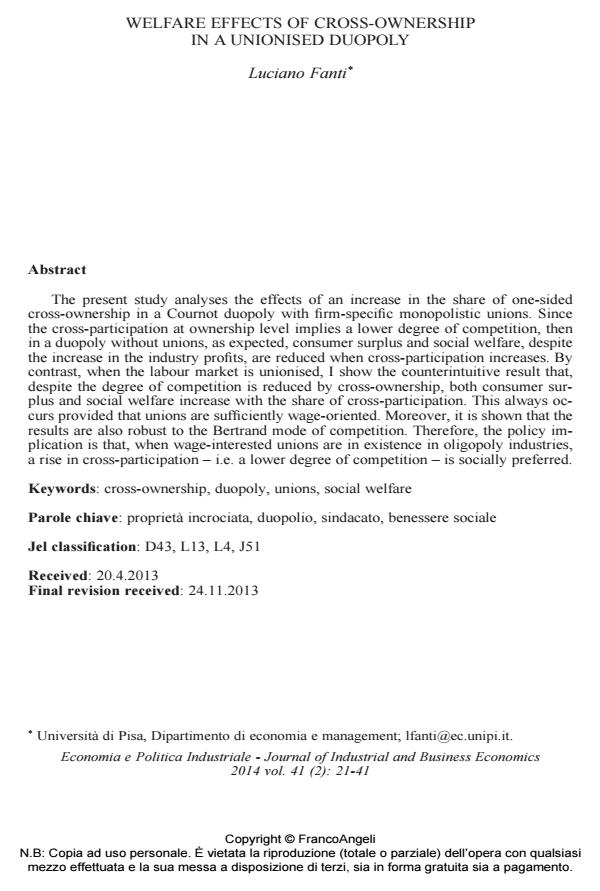Welfare effects of cross-ownership in a unionised duopoly
Journal title ECONOMIA E POLITICA INDUSTRIALE
Author/s Luciano Fanti
Publishing Year 2014 Issue 2014/2
Language English Pages 21 P. 21-41 File size 201 KB
DOI 10.3280/POLI2014-002002
DOI is like a bar code for intellectual property: to have more infomation
click here
Below, you can see the article first page
If you want to buy this article in PDF format, you can do it, following the instructions to buy download credits

FrancoAngeli is member of Publishers International Linking Association, Inc (PILA), a not-for-profit association which run the CrossRef service enabling links to and from online scholarly content.
The present study analyses the effects of an increase in the share of one-sided cross-ownership in a Cournot duopoly with firm-specific monopolistic unions. Since the cross-participation at ownership level implies a lower degree of competition, then in a duopoly without unions, as expected, consumer surplus and social welfare, despite the increase in the industry profits, are reduced when cross-participation increases. By contrast, when the labour market is unionised, I show the counterintuitive result that, despite the degree of competition is reduced by cross-ownership, both consumer surplus and social welfare increase with the share of cross-participation. This always occurs provided that unions are sufficiently wage-oriented. Moreover, it is shown that the results are also robust to the Bertrand mode of competition. Therefore, the policy implication is that, when wage-interested unions are in existence in oligopoly industries, a rise in cross-participation - i.e. a lower degree of competition - is socially preferred.
Keywords: Cross-ownership, duopoly, unions, social welfare
Jel codes: D43, L13, L4, J51
- Passive Unilateral Cross-ownership and Strategic Trade Policy Luciano Fanti, Domenico Buccella, in Economics 20160010/2016
DOI: 10.5018/economics-ejournal.ja.2016-10 - Social welfare and cross-ownership in a vertical industry: When the mode of competition matters for antitrust policy Luciano Fanti, in Japan and the World Economy /2016 pp.8
DOI: 10.1016/j.japwor.2016.02.004 - A Simple Model for the Integration of Goods and the Capital Market with Unionized Labor Markets Domenico Buccella, in Ekonomika /2019 pp.19
DOI: 10.15388/Ekon.2019.1.2 - Unionized duopoly, market competition with differentiated products, and welfare Domenico Buccella, in Economia e Politica Industriale /2015 pp.455
DOI: 10.1007/s40812-015-0018-1 - Partial Cross-Ownership, Cost Asymmetries, and Welfare Luciano Fanti, in Economics Research International /2015 pp.1
DOI: 10.1155/2015/324507 - Duopoly, Optimal Proportion of State-Owned Shares and International Cross-Ownership Junlong CHEN, Hao TANG, Jiali LIU, in Revista de Cercetare si Interventie Sociala /2019 pp.352
DOI: 10.33788/rcis.64.26 - Strategic trade policy with interlocking cross-ownership Luciano Fanti, Domenico Buccella, in Journal of Economics /2021 pp.147
DOI: 10.1007/s00712-021-00745-9 - Cross-ownership in network industries: when less competition implies less profits or more social welfare Domenico Buccella, Luciano Fanti, Luca Gori, in Journal of Economics /2025 pp.203
DOI: 10.1007/s00712-024-00888-5 - Union negotiations, product market cooperation, and profits Domenico Buccella, Leonard F. S. Wang, in Metroeconomica /2021 pp.82
DOI: 10.1111/meca.12311
Luciano Fanti, Welfare effects of cross-ownership in a unionised duopoly in "ECONOMIA E POLITICA INDUSTRIALE " 2/2014, pp 21-41, DOI: 10.3280/POLI2014-002002